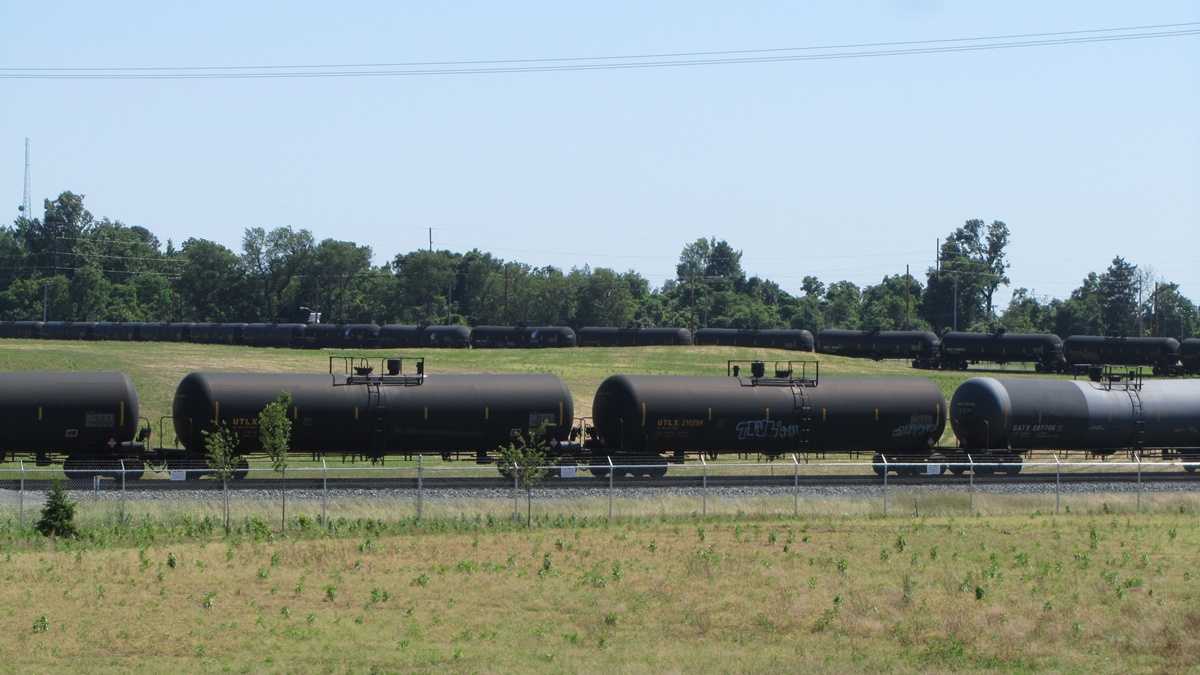Board dismisses appeal to block Delaware City refinery project

A Board denied an appeal aiming to block a Delaware City refinery project allowing for the shipment of ethanol. (File/WHYY)
A Delaware City refinery could be a step closer to transporting ethanol.
An appeal to block a permit allowing a refinery to receive and store unblended ethanol and transfer it by barge between its Delaware City docking facility and other locations on the East Coast was dismissed by the Coast Zone Industrial Control Board Monday.
In December, Delaware’s Department of Natural Resources and Environmental Control approved PBF Energy a permit for the $7 million project at its Delaware City refinery that would allow for the shipment of up to 10,000 barrels of ethanol per day.
But the Delaware Audubon Society and the League of Women Voters argued the project would violate Coastal Zone Act laws, which prohibit bulk product transfer operations.
The organizations appealed DNREC’s decision, stating the project would increase train and barge traffic, causing significant harm to Delaware City’s environment and residents.
During a public hearing Monday held to hear arguments from both sides, the Board dismissed the appeal, siding with PBF attorneys who said the appeal didn’t have legal standing. The Board made the decision with a 5-1 vote.
“I think the board who was there was ill-equipped to deal with an issue with these particulars,” said Matt DelPizzo, president of the Audubon Society.
“If you believe the refinery that their increased activities weren’t going to cause any harm then standings a moot point and they shouldn’t have quasi courts set up for that purpose. If you are to believe increased activities can and will produce harm we have standing.”
The Delaware Audubon Society and the League of Women Voters have been fighting PBF’s project for several months, pointing to Coastal Zone Act Laws and its regulations on bulk transfers.
Refineries that existed before the Act passed in 1971, including the one in Delaware City, were grandfathered in, but were required to receive a permit before making additional expansions.
The Delaware City refinery argued its project doesn’t violate the Act because it already receives shipments of ethanol at its facility and the project doesn’t require major modifications. The refinery also insisted it didn’t require a permit for the project.
DNREC concluded the refinery does in fact require a permit for the project. However, the department disagreed with opponents that the refinery would break CZA laws by completing the project, therefore issuing permit approval.
The permit requires the refinery to mitigate any negative impact to the environment. The project would create new emissions of about a ton or less, and the refinery agreed to install pollution control technology—that equipment must be approved by a separate air permit and installation is required prior to the moving of ethanol.
During Monday’s hearing appellate attorney Ken Kristl and members of the Audubon Society argued the project would have adverse impacts to aesthetics and recreational activities in Delaware City that are protected by the Coast Zone Act. They said residents will be affected by the expansion because it would allow for more train and barge activity in the area.
DelPizzo testified he and his wife frequent Delaware City and its businesses, and would avoid patronizing restaurants and the like if a barge was present for offloading.
“It takes away from the enjoyment of the leisure, eating and drinking on the waterfront,” he said. “I think if this goes through as they would like it to we would abstain from going to Delaware City, period.”
David Carter, a former DNREC employee and a member of the Delaware Audubon Society and the Women League of Voters, said he enjoys kayaking to Pea Patch Island and taking photos of the herons that occupy the area. But he said the barges would interfere with his activities.
“When a large vessel is moving or coming by it’s kind of an, ‘Oh, shit’ moment….You have to paddle quick and get away,” Carter said. “There’s always concerns about a possible spill, there’s always a concern for an explosion, particularly for ethanol, which is highly flammable.”
He also added that increased train traffic is another concern, and the possibility of one blowing up is “frankly, something that’s scary for me.”
Witness Mark Martell, the longest standing board member of the Delaware Audubon Society, said living next to the train tracks already affects him. He said he sometimes has difficulty sleeping due to the noise, and he has to keep his windows shut because of the fumes.
“It affects the way we live,” Martell said. “My fear is it gets worse and this adds to that.”
Bart Cassidy, one of the attorneys representing PBF, argued there’s no evidence the project will affect the city and its residents or that there will be increased barge and train activity.
“Every piece of testimony this morning…relates to current activity of the refinery,” he said. “Not a single witness has come forth with any evidence that there will be an increase of rail or barge traffic.”
Appellate attorney Ken Kristl argued the permit was improperly issued, and that it causes injury to the residents of Delaware City, stating that adding five times more ethanol to operations will require more barge and train use.
“They don’t dine out anymore, they don’t or it’s harder for them to kayak on the river, they can’t sleep at night,” he said. “It’s impossible to say something in the future is harming us now, but what we know what happens now is hurting them and what happens in the future will hurt them more.”
Still, most of the board members sided with PBF.
“The appellants identified their specific basis for challenging this action on the grounds they believed there would be certain harms caused by increase in rail and barge traffic primarily, but offered no evidence there would be increased rail and barge traffic,” said attorney Cassidy after the ruling.
“And the record created for the permit identifies the rail will displace previously existing rail and the barge loading activity must happen with previously existing allowable throughput levels for gasoline, so in fact the record shows there will not be an increase in barge or rail activity.”
However, members of the Delaware Audubon Society say they don’t trust the refinery, saying it regularly misleads the public.
Last year, DNREC issued a violation notification to the refinery for transporting crude oil beyond its limitation restrictions.
The DNREC violation notification states in 2013 it issued an ordinance to the company allowing it to transfer crude oil only to a location in Paulsboro, NJ—but that it violated that ordinance by since transporting material to other locations.
In 2015, DNREC learned the company shipped to a location other than Paulsboro, after an anonymous source tipped off the Delaware Department of Justice.
Refinery representatives met with DNREC and the state DOJ in November 2015 to discuss the incident, and stated the delivery was a “one-time shipment to an alternative facility due to an unanticipated logistical irregularity regarding the movement of crude oil,” according to the violation notification.
DNREC let the “one-time” occurrence pass. However, the company recently admitted to other incidents of crude oil transportation.
Cassidy said the company takes regulations “very seriously.”
A spokesperson for PBF said in an email, “We are pleased the Coastal Zone Board granted Delaware City Refining Company LLC’s motion to dismiss the appeal for lack of standing. This reinforces our previously-stated position that DNREC clearly acted within its legal authority when the agency granted the refinery a permit to ship ethanol across its docks.”
Attorney Kristl said he’s disappointed with the board’s decision and will determine whether or not to file an appeal after the Board has issued a written decision. The appellants have 30 days after the written decision is issued to file.
WHYY is your source for fact-based, in-depth journalism and information. As a nonprofit organization, we rely on financial support from readers like you. Please give today.





